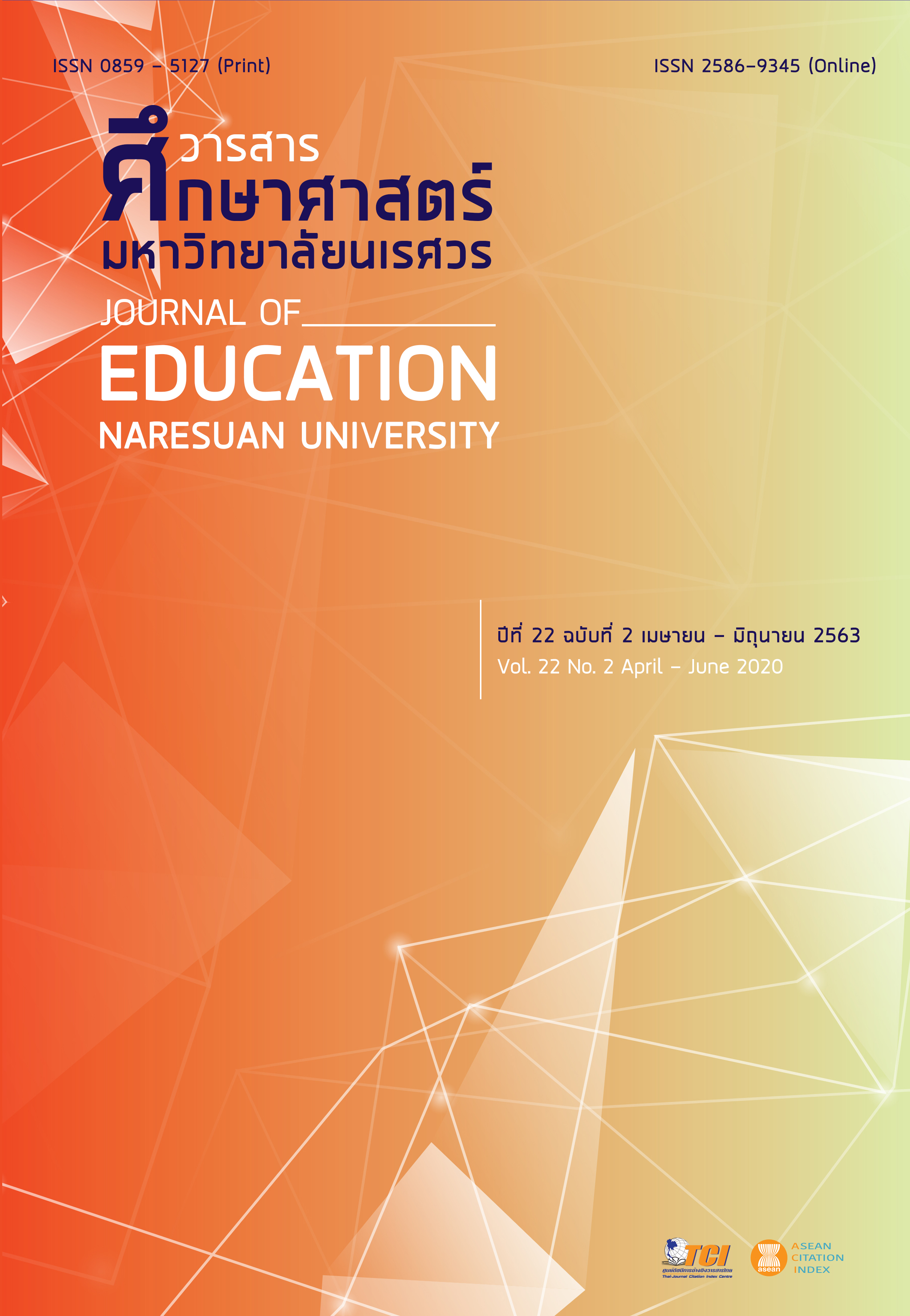THE RESULTS OF MATHEMATICAL LEARNING ACTIVITIES BY 7E LEARNING CYCLE USING GEOGEBRA PROGRAM ON THE FUNDAMENTAL DATA ANALYSIS FOR GRADE 12 STUDENTS OF PRACHUAPWITTHAYALAI SCHOOL
Main Article Content
Abstract
The purposes of this research were 1) to study the mathematical learning achievement on the Fundamental Data Analysis for grade 12 students with the 7E Learning Cycle using GeoGebra Program and 2) to study students’ satisfaction towards the 7E Learning Cycle using GeoGebra Program. The sample consisted of 30 students who were from 3 classes of grade 12 students who studied the 2nd semester of school year 2016. They were selected by stratified random sampling. The research instruments were the Fundamental Data Analysis with the 7E Learning Cycle using GeoGebra Program lesson plans, the achievement tests, and the questionnaires. The research revealed that 1) the average achievement score was 16.77 (67.07 percentage of 25 points) which was statistically significant higher than 60 percent criterion, and 2) students’ satisfaction towards the 7E Learning Cycle using GeoGebra Program were at a high agreement level.
Article Details
The owner of the article does not copy or violate any of its copyright. If any copyright infringement occurs or prosecution, in any case, the Editorial Board is not involved in all the rights to the owner of the article to be performed.
References
Angganapattarakajorn, V. (2012). Knowledge for mathematics teachers: Curriculum, instruction and research. Bangkok: Jaransanitwong Publication. [in Thai]
Hee-Chan Lew, Kyeong-Sik Choi, & Seo-Young Jeong. (2010). How do students act with dynamic mathematics software in classroom? Retrieved from http://atcm.mathandtech.org/EP2010/regular/3052010_18487.pdf
Institute for the Promotion of Teaching Science and Technology. (2011). Professional mathematics teachers, road to success. Bangkok: Institute for the Promotion of Teaching Science and Technology. [in Thai]
Khemmani, T. (2015). Pedagogy, knowledge for effective teaching. Bangkok: Chulalongkorn University Press. [in Thai]
Leekitwattana, P. (2010). Educational research method. Bangkok: Faculty of Technical Education, King Mongkut’s Institute of Technology Ladkrabang. [in Thai]
Maiduang, A. (2014). Connection between mathematics and STEM. IPST Journal, 42(186), 16-20. [in Thai]
Majerek, D. (2014). Application of GeoGebra for Teaching Mathematics. Advances in Science and Technology Research Journal, 8(24), 51-54.
Makanong, A. (2013). The content of mathematical essence and methodology. Bangkok: Sukhothaithammathirat University Press. [in Thai]
Makanong, A. (2015). Mathematics for secondary teachers. Chulalongkorn University Press. [in Thai]
Malithong, K. (2005). ICT for education. Bangkok: Arun Publication. [in Thai]
National Institute of Educational Testing Service. (2015). The 2nd report-statistics of O-NET for school in Matthayomsuksa VI academic year 2013-2015 which separated by learning standard. Bangkok: National Institute of Educational Testing Service. [in Thai]
Pattamakomol, T., Naoyemphon, P., & Chantarasonthi, U. (2013). The effect of organizing mathematics learning activity on the topic of trigonometry ratio using 5E model of teaching on mathematics knowledge connection of Matthayomsuksa IV students at Marie Vithaya School in Nakhon Ratchasima Province. Journal of Education Naresuan University, 15(3), 95-102. [in Thai]
Pattamawipak, S. (2014). Mathematical literacy evaluation of PISA 2015. IPST Journal, 42(188), 35-39. [in Thai]
Pattanatrakulsuk, K. (1997). The geometric explanation of secondary mathematical abstraction. Educational Review Journal, 2, 55-58. [in Thai]
Phabu, S. (2015). Using GeoGebra program to supplement learning activities to solve mathematical problems according to Polya’s problem-solving process in basic calculus of Matthayomsuksa VI students (Master thesis). Nakhonratchasima: Nakhonratchasima Rajabhat University. [in Thai]
Pipitkul, Y. (1996). Mathematical instruction. Bangkok: Bopit Publication. [in Thai]
Polkwamdee, P. (2014). Comparison of learning achievement in mathematics on inequality of Matthayomsuksa III students using 7E inquiry learning and SSCS method (Master thesis). Chonburi: Burapha University. [in Thai]
Prodromou, T. (2014). GeoGebra in teaching and learning introductory statistics. Electronic Journal of Mathematics & Technology, 8(5), 363-376.
Sukjaiworawate, A. (2010). The development of learning outcome on adding and subtracting of first grade students taught by 7E learning cycle approach (Master thesis). Bangkok: Silpakorn University. [in Thai]
Tinprapa, T. (2014). Mathematical Literacy, necessary skill in the 21st century. IPST Journal, 42(187), 23-26. [in Thai]
Wiangwalai, S. (2013). Learning management. Bangkok: Odian Store. [in Thai]
Wongjumrus, S. (2012). Effects of the 7E learning cycle instruction on learning achievement and problem solving skills in mathematics on linear equations in one variable of Matthayomsuksa I students (Master thesis). Chonburi: Burapha University. [in Thai]
Wongsanon, V. (2014). Using the GeoGebra program as a learning tool for solving word problems on the three-dimensional geometric figures and volume of rectangular shape for Prathomsuksa VI students with Polya’s solving steps (Master thesis). Nakhonratchasima: Nakhonratchasima Rajabhat University. [in Thai]


